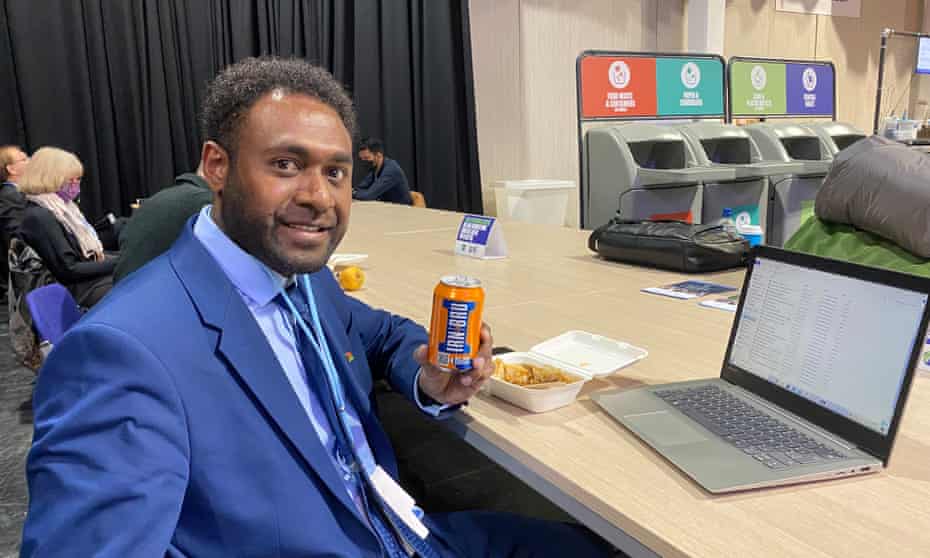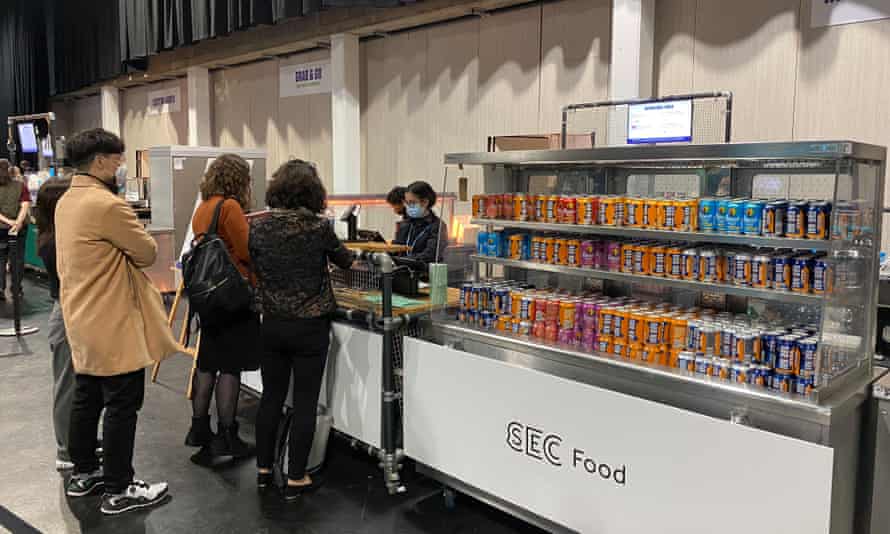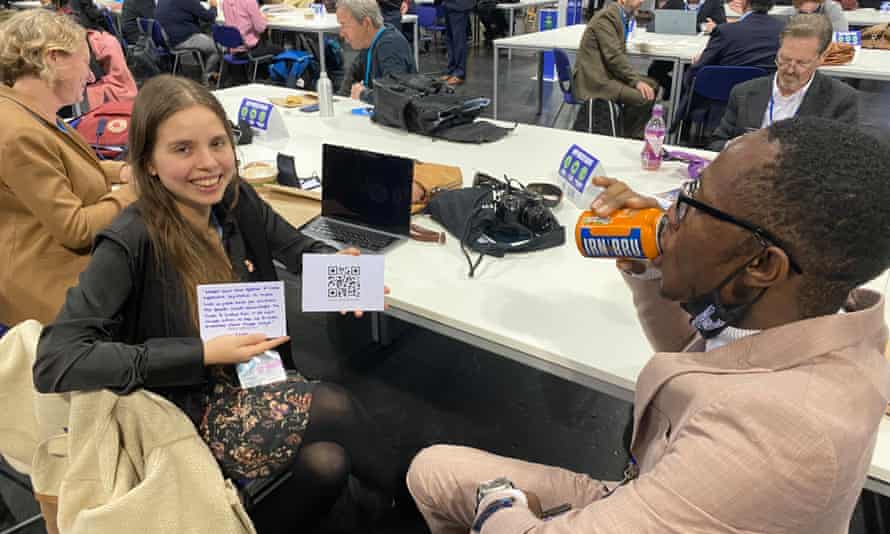‘The first sip was rather shocking’: Cop26 delegates try Irn-Bru for the first time
Some conference visitors are now hooked on Scotland’s famous fizzy drink, while others can’t wait to leave it behind

Last modified on Fri 5 Nov 2021 13.49 EDT
Alongside a post-work dram of whisky and a lunchtime haggis, delegates at Cop26 have been getting acquainted with another Scottish delicacy: Irn-Bru. Gleaming mounds of the rust-coloured drink are on sale throughout the SEC convention centre in Glasgow, and it has proved a hit with people from all corners of the planet – and a miss with others.
The Zimbabwean presidential spokesperson got the party started on Monday, sharing a picture reportedly showing members of the delegation emerging from a Glasgow Costco with trolleys full of Irn-Bru and alcohol for an event that evening. The drink, which Donald Trump banned from his luxury golf resort in Turnberry in 2018, also has a new fan from the South Pacific.
Dreli Solomon, a negotiator from Vanuatu, has drunk the orange fizzy drink twice a day since he first tried it. “It’s my first time in Scotland. I’ve never seen this drink before. I’ve tasted it and I am hooked on it,” he said, enjoying a can over lunch in the Cop26 food hall. “It’s boosting me, giving me adrenaline. I like it.”
Azeez Abubakar, a youth climate campaigner from Nigeria, has also given the drink a thumbs up. “Since I got to Scotland, it’s the main drink. It’s mostly available in the different stores and I have discovered that it’s unique to Scotland. I don’t see it anywhere else in the world,” he said at a a nearby table in the food hall.
“Our Airbnb host left us Irn-Bru for when we arrived,” said Abubakar’s colleague, Ines Yabar. “That was one of our welcome gifts.”
Irn-Bru – often referred to as Scotland’s other national drink – first hit the shelves in 1901 to satisfy the thirst of steel workers working on the Glasgow Central station who were drinking too much beer, according to the legend carried by its manufacturer, AG Barr.
The bright orange combination of 32 flavours alongside a number of other ingredients, including aspartame and caffeine, has been heavily debated in Scotland ever since. To some, it is reminiscent of fizzy bubblegum. Others have dismissed it as sweetened mouthwash. At Cop26, the argument continued this week.

“In the Rwandan delegation, we were asking what it was. Is it lemonade? Is it cola? Is it alcohol? It’s not even written what it is. I don’t understand it,” said Malaika Doucelline Rousseau while drinking her first ever Irn-Bru in the canteen. “There is only this brand. I don’t understand why no Coca-Cola, no Fanta. It’s not very good. It’s like water with a strong sugar taste with a little bit of flavour,” she said.
Due to a sponsorship deal with AG Barr, there is no Pepsi or Coke available in the conference centre. The American diplomat Philip Thomas Reeker had prepared himself and his team for what to expect before Cop26 – posting a tasting session on Twitter beforehand.
But would Rousseau recommend it to others? “No. No way.”
The German delegate Michael Buechl was also a sceptic. He had his first can a few days ago with fish and chips, and was busy forcing himself to drink a second in the food hall. Buechl was drinking a can of Irn-Bru Xtra – one of the three types available at Cop26.
“My head told me: just get another one. You get used to it,” he said. “I knew it was typically Scottish because I watched the film The Angels’ Share [a Ken Loach movie set in Glasgow]. So I had to try it. It was not not the nicest experience I’ve ever had. The first sip was rather shocking. But then it fits quite well together with the fish and chips. So I just got got another one.
“It will not become my favourite drink and probably I won’t drink it outside of Scotland. But it just becomes part of the experience.”

Some delegates said they were drinking Irn-Bru out of necessity. Ivan, a delegate from Quebec who did not give his second name, said: “It’s the only thing I can drink here. It’s low-fat and sugar-free. It’s good!”
In 2018, a decision to reformulate the drink due to a new sugar tax from the UK government was met with outcry, with reports that angry Scots were stockpiling the drink before the change.
Ryan Allen, who started the Hands Off Our Irn-Bru campaign, called the drink “a natural treasure” in Scotland, “well known to alleviate the effects of a hangover and … many a person’s craving, saviour or go-to drink after a night on the tiles”. In March this year, campaigners got their wish, and the original version returned to the shelves.
